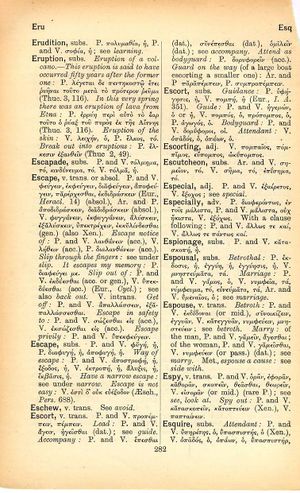escape
Περὶ τοῦ ἐπέκεινα τοῦ νοῦ κατὰ μὲν νόησιν πολλὰ λέγεται, θεωρεῖται δὲ ἀνοησίᾳ κρείττονι νοήσεως → On the subject of that which is beyond intellect, many statements are made on the basis of intellection, but it may be immediately cognised only by means of a non-intellection superior to intellection
English > Greek (Woodhouse)
verb transitive or absolute
P. and V. φεύγω, φεύγειν, ἐκφεύγειν, διαφεύγειν, ἀποφεύγειν, παρέρχεσθαι, ἐκδιδράσκειν (Eur., Heraclidae 14) (absol.), Ar. and P. ἀποδιδράσκειν, διαδιδράσκειν (absol.), V. φυγγάνειν, ἐκφυγγάνειν, ἀλύσκειν, ἐξαλύσκειν, ὑπεκτρέχειν, ἐκκυλίνδεσθαι (gen.) (also Xen.).
escape notice of: P. and V. λανθάνειν (acc.), V. λήθειν (acc.), P. διαλανθάνειν (acc.).
slip through the fingers: see under slip.
it escapes my memory: P. διαφεύγει με.
slip out of: P. and V. ἐκδύεσθαι (acc. or gen.), V. ὑπεκδύεσθαι (acc.) (Eur., Cyclops); see also back out. verb intransitive
get off: P. and V. ἀπαλλάσσειν, ἐξαπαλλάσσεσθαι.
escape in safety to: P. and V. σώζεσθαι εἰς (acc.), V. ἐκσώζεσθαι εἰς (acc.).
escape privily: P. and V. ὑπεκφεύγειν.
substantive
P. and V. φυγή, ἡ, P. διαφυγή, ἡ, ἀποφυγή. ἡ.
way of escape: P. and V. ἀποστροφή, ἡ, ἔξοδος, ἡ, V. ἐκτροπή, ἡ, ἄλυξις, ἡ, ἔκβασις, ἡ.
have a narrow escape: see under narrow.
escape is not easy: V. ἐστὶ δ' οὐκ εὐέξοδον (Aesch., Persae 688).
Spanish > Greek
ἔκπτωσις, ἀνάφυξις, ἐκπλοκή, ἔκροια, ἀναφυγή, ἔκδυσις, ἀποστροφή

